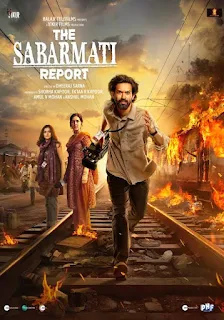Director: Dheeraj Sarna
Numerous events occur constantly in India. With such a vast population, all possessing clear minds and no hesitation in expressing their views, skirmishes are inevitable. The issue is that resolutions or conclusions to these conflicts are rarely found. Legal processes for achieving closure and incarcerating the perpetrators are agonisingly slow. When justice is attained, the public loses interest and shifts focus to more pressing matters. The tragic fire that claimed the lives of 59 individuals in two coaches of the Sabarmati Express, which was travelling from Ayodhya to Ahmedabad on 27 February 2002, serves as an example. The train, carrying numerous volunteers and devotees, was returning from Ayodhya. During a scheduled stop at Godhra, Gujarat, chaos erupted, and before long, the passengers found themselves trapped in a burning train.
Shortly after the incident, the State of Gujarat set up a heavily criticised one-man Commission led by retired judge K.G. Shah to investigate the matter and establish whether it was accidental or criminal. Substantial criticism arose regarding the choice of investigator, Shah, who was known to have close ties with then Chief Minister of Gujarat, Narendra Modi. A second investigator, Nanavati, another retired judge, was later added to the Commission.
In 2003, the Concerned Citizens Tribunal concluded that the incident was an accident, ruling out foul play. In 2008, the Nanavati-Shah Commission released its preliminary report, which unequivocally asserted that the Godhra incident was orchestrated by local Muslims, identifying an Islamic strongman as its mastermind. The report faced significant condemnation, primarily because of its timing, which coincided with the upcoming State Elections. Shah passed away months before the report's release, and another retired judge, Mehta, took over his role.
Six years later, in 2014, the Nanavati-Mehta Commission issued their findings. It classified the Godhra Station incident as a planned conspiracy. Local Muslim leaders, knowing that the train would be carrying Hindu devotees from Ayodhya, methodically staged a frenzied mob, locked in passengers of a single train coach, poured petrol and lit them, and killed all its passengers, including women and children.
Throughout, the police and courts operated independently of any reports. They determined that a conspiracy had indeed occurred and sentenced 31 individuals to life imprisonment. Nevertheless, the alleged mastermind was acquitted.
The film aims to retell the story from the perspective of a young cameraman, Samar Kumar, who works for a reputable television station. His first assignment centres on the Godhra incident, leading him to disillusionment with the entire system. What he captures on camera sharply contrasts with what is reported to the world. The executives at a higher level control the narrative.
Samar departs from the media—whether by choice or necessity—and spirals into self-destruction through alcohol. His life receives a renewed chance when another young journalist uncovers his footage and reopens the case.
The film seeks to illustrate the divide in Indian media between English-language channels and vernacular options, specifically Hindi in this case. The English-language channels are depicted as submissive to their Congress leaders, who may have their own agendas.
For a long time, foreign channels have faced accusations of biased reporting on news related to India. Additionally, many local Indian channels are extensions of these parent companies from elsewhere. It is also claimed that several Indian channels are owned by Christian missionary groups based abroad. With numerous allegations of forced conversions by these groups, people are left to ponder where their loyalties lie - with Bharat Mata or with their paymasters in the Southern Baptist Church, the Communist Party, or an unidentified figure?
google.com, pub-8936739298367050, DIRECT, f08c47fec0942fa0













